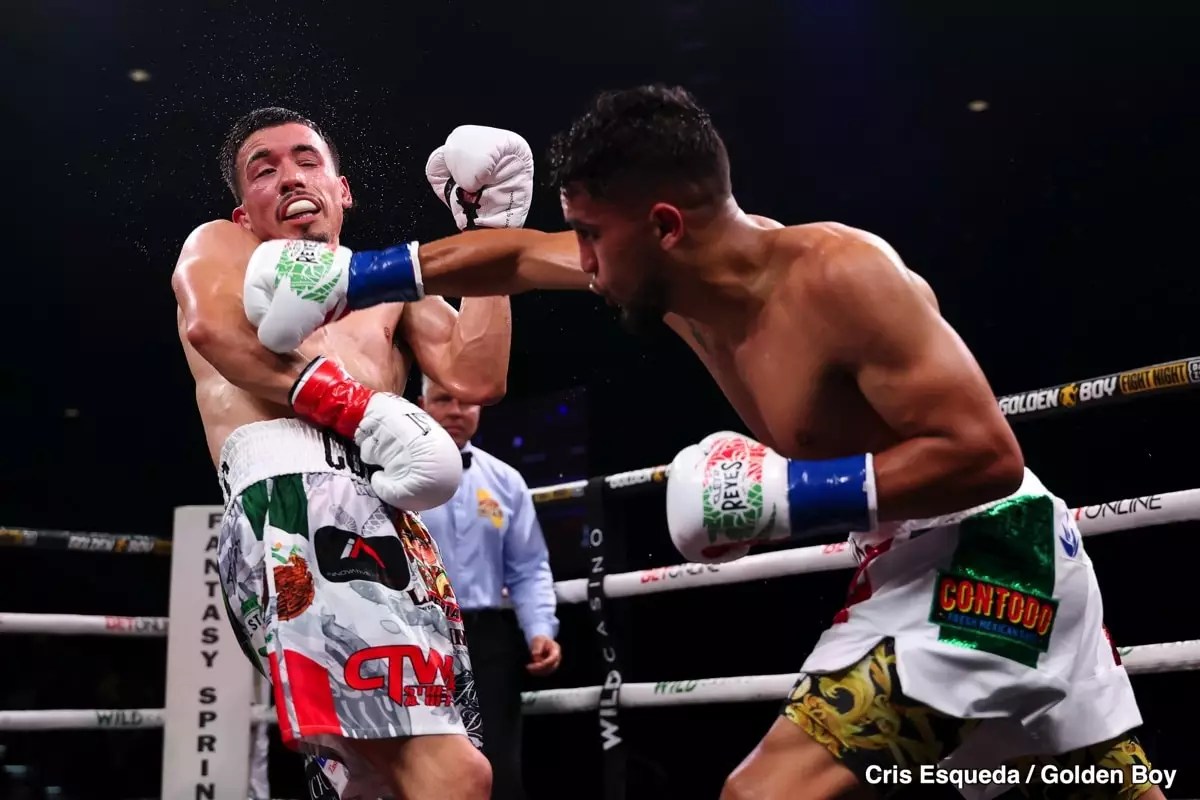Boxing, often symbolized as the sweet science, sometimes devolves into chaos, confusion, and even disrespect—not just among fighters but also from the very officials charged with judging their performances. The recent Golden Boy Fight Night at Fantasy Springs showcased a microcosm of these issues, with the main event ending in a contentious draw that left more questions than answers. The judges’ scores—93-97, 95-95, and 95-95—appeared as an apathetic shrug instead of a definitive assessment of a physically taxing, well-matched encounter. The fighters’ reactions highlight a deeper malaise within the sport: respect for opponents, accountability, and trust in the judging system have been diminished.
Jorge Chavez’s outrage was palpable when he called the majority draw into question, emphasizing how his face had been cut by a headbutt rather than a punch and asserting that Flores lacked real punching power. This isn’t a minor grievance but a reflection of how fighters are often left to question the integrity of decisions that impact their careers. If judges are indifferent or inattentive, then boxing risks losing its credibility as a sport where clear, justified outcomes matter. Chavez’s bold call-out of another undefeated prospect, Picasso, suggests a dangerous desire to reshape the narrative—possibly to instill a sense of genuine competition and accountability. Yet, all that remains to be seen is whether the sport’s institutions will listen or just continue to reward mediocrity with complacent verdicts.
The core issue isn’t merely the fight’s outcome but the underlying philosophy of judging and sportsmanship. When judges seem disconnected, it fosters an environment where fighters are forced to second-guess their efforts, and spectators are left disillusioned. Boxing’s reputation is fragile enough without the addition of dubious decisions. If fighters want to truly prove their worth, they need an honest assessment—one that encourages aggressive, honest competition, not one that rewards inactivity or passive defense.
The Rise of the Scripted and the Demise of Competitiveness
The co-main event further exemplifies the disparity between what boxing claims to be and what it has become. The audaciously hyped Jordan Panthen was scheduled to showcase dazzling power and charisma, yet he was unexpectedly blinded by a seasoned tactician, Farid Ngoga. Instead of relying on hype and flash, Ngoga demonstrated the true essence of boxing: strategic thinking, patience, and calm execution. The majority decision—one judge calling it a draw—suggests a sport that still, on some level, values genuine skill over spectacle.
Ngoga’s victory stood as a testament to the importance of boxing IQ—fighting smart rather than throwing flashy punches on the surface. To those who chase fame with bravado, this serves as a stark warning: substance outshines showmanship. Panel debates and promotional hype often mask the reality that genuine skill and tactical mastery remain the pillars of lasting success in boxing. It’s a reminder that boxing will evolve only when competitive integrity is prioritized over marketing gimmicks.
Boxers like Grant Flores and Leonardo “Bazooka” Sanchez further ignite this truth. Flores’s quick work over Todd Manuel, ending with a body shot TKO, reveals that durability and precision still reign supreme. Similarly, Sanchez’s brutal knockout of Valdez demonstrates the raw power that fans crave—unfiltered, decisive, and honest. These moments harken back to boxing’s roots, where resilience and grit triumph over pretense. As fans, we crave fighters who are not just content with survival but are willing to confront adversity directly, embodying the sport’s fighting spirit.
The Sanity in Simplicity: Clear Wins Amidst Chaos
In stark contrast to the chaos of draw decisions and questionable officiating are fights that unfold with clarity and purpose. Javier Meza’s convincing six-round victory over Cesar Villarraga exemplifies this. With judges in perfect accord, Meza’s clean, decisive performance reminds us what boxing is meant to be: a battle of skill, strategy, and ferocity that invites no doubts. Such performances serve as a benchmark for the sport’s potential if honesty and integrity are prioritized.
Meanwhile, the preliminary bouts offered a spectrum of outcomes—some thrilling, others underwhelming. Bryan Lua and Kevin Piedrahita’s drawn bout, with two judges favoring Lua but a third seeing it as a tie, underscores the sport’s ongoing struggle with subjectivity. When the fight is evenly matched and judges are divided, the result is often a shrug from the audience—further eroding faith in the judging process. Nonetheless, the fight between Guzman and Arregui provided a glimpse of boxing at its best—in this case, clear decision, honest effort, and relentless pursuit of victory.
The true strength of modern boxing lies in these moments. When fighters approach each bout with discipline, perseverance, and authenticity, they remind fans of the sport’s core values. It’s time for the boxing community—judges, promoters, fighters, and fans alike—to demand more of itself. Only then can the sport truly rise above the mediocrity that too often taints its reputation.
—
This critique aims not just to analyze recent fights but to challenge the very foundation of what boxing is today. The sport’s soul is being tested—a battle between spectacle and sincerity, showmanship and skill, indecision and clarity. As fans and stakeholders, acknowledging these issues and demanding change is essential. The question remains: will boxing continue down this path of disillusionment, or can it rediscover the integrity that once made it the pinnacle of combat sports?


Leave a Reply